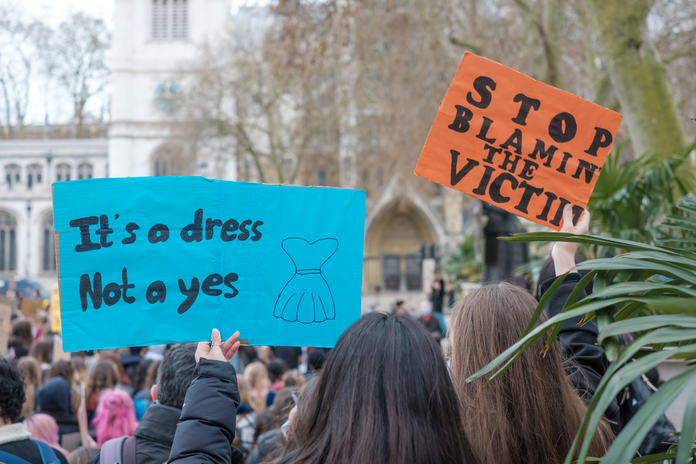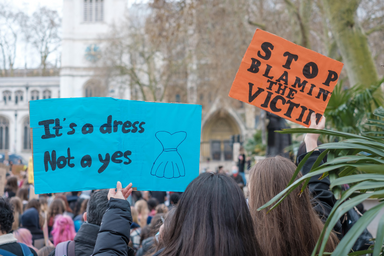With 71% of women reporting that they have experienced sexual harassment in public spaces last year, the government’s recent proposal that street harassment should be specifically criminalised is perhaps long overdue. Predictably, shortly after a BBC article on the subject was published, some men started outing themselves on Twitter as the exact targets of this proposed legislation. Never wolf whistled before in my life but feeling compelled to start now. Plenty see it as a compliment. All with a healthy dose of victim blaming, #NotAllMen, “political correctness gone mad” and open speculation about why staring, catcalling or otherwise “harmless flirting” on the street was being criminalised.
One commenter made the point that ‘I don’t see new laws or increasing penalties ever really having much effect on behaviours,’ before adding that ‘the last time I murdered someone I didn’t hesitate for a minute to consider more harsh sentencing making it worth it or not [sic].’ So, pretty much an average day on the app.
Social media is not real life, but these reactions raise a few important questions about what this legislation means for women’s safety. Namely, what difference will this law actually make? Considering accusations of sexual harassment within the police force and the murder of Sarah Everard, perpetrated by a serving police officer, what use will more legislation be if some of the very people who are meant to keep women safe are actively harming us?
Firstly, let’s take a look at the proposed law itself. Harassment is of course already banned in the UK, but it is hoped that the new legislation will encourage more women to come forward. Street harassment could be punished with jail sentences of up to two years, with blocking someone’s path, making offensive gestures and following among the behaviours that are set to be criminalised. Campaigners are also calling for wolf-whistling and intense staring to be banned.
The legislation, which could come into effect next year, has been welcomed by prominent MPs as well as the wider public. And a change is desperately needed. Just last week, Channel 4 released a distressing snippet from its new documentary, Undercover: Sexual Harassment – The Truth, in which an undercover journalist is followed back to her hotel room by a man she had never met. Anyone can experience sexual harassment in public, but it is disproportionally directed towards women and girls, and anything that seeks to curb this epidemic of violence is surely a step forward.
Proponents of the bill have emphasised that there is strong support for it among women and girls. According to Plan UK, 72% of girls said that knowing that street harassment was a criminal offence would make them more likely to report it to the police. The criminalisation of this behaviour is also intended to send a clear message about what is and what is not an acceptable way to behave in public. Earlier this year, London Mayor Sadiq Khan stated that a ‘cultural shift‘ is needed to help end violence against women. Therefore, this law could help to further cement the intimidation of women in public as an unacceptable social taboo, reducing the propensity of men to engage in it.
On the other hand, as highlighted by our commenters earlier, it is difficult to be sure of whether this law will make a difference, or if it amounts to nothing more than government posturing. Having introduced a similar law in 2018, those who harass anyone in the street in France could be hit with a fine of up to 1500 euros. However, according to Libération, the data shows that there has actually been an increase in the number of infractions since 2018, while only 25% of perpetrators were actually fined in 2019-2020.
Additionally, in a piece from the right-wing online magazine Spiked, notably entitled ‘Intersectional feminists are gaslighting women‘, the author Joanna Williams writes that the proposed legislation needlessly victimises women, claiming that millions go out and return home safely every night. Therefore, they only feel vulnerable because laws like this tell them that they are easy targets. Women just need to toughen up.
Readers of this article can no doubt be spared from the avalanche of statistics proving that women have more than enough reason to be on their guard on a night out. A year on from the spiking epidemic and the resulting ‘Girls Night In’ campaign, it is difficult to ascertain how much has actually changed. Yes, in the majority of cases, a woman in the UK can reasonably assume that she will not encounter any danger when going out. But the moment she lets her guard down, the same people who deride this legislation as overkill will be quick to blame the victim for not being “careful” enough. As the case of Sabina Nessa proved, simply walking home can get you killed.
Also mentioned in the article is a striking quote from Joanna Lumley, on the subject of a simpler time, when women knew to just grin and bear it: ‘If someone whistled at you in the street, it didn’t matter. If someone was groping, we slapped their hands. We were quite tough and looked after ourselves.’
Whether it is aggressive staring and catcalling to being groped and followed, women are used to the harassment they risk receiving in their day-to-day lives. In 2019, Plan UK revealed that 42% of girls aged 14-21 suffered in silence after being sexually harassed in public, while 76% of girls who have experienced harassment have never reported it. Since these offences are systematically going unpunished, to suggest that women aren’t already forced to just put up with them is laughable. Perhaps this is the biggest indicator of a much larger problem.


